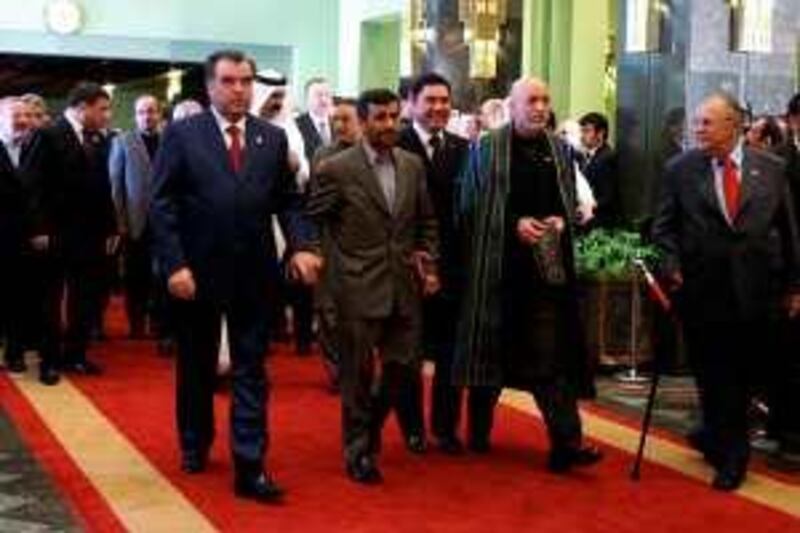Facing accusations at home of mishandling Iran's economy, Mahmoud Ahmadinejad, the Iranian president, yesterday blamed the West for the global economic crisis and declared that capitalism is collapsing.
"The [global] economic order is unfair and irresponsible," he said, addressing a summit of regional leaders in Tehran from the 10-nation Economic Co-operation Organisation (Eco). "The liberal economy and the free market have failed." Proof of this was American and European efforts to bail out big companies and inject money into the market, he said, blaming the meltdown on a lack of western moral fibre.
"Unfortunately, emptying the economy of moral and religious values and imposing completely profiteering mechanisms has caused economic and social problems," he said. The Iranian president called for greater economic co-operation between Eco members, which include Turkey, Pakistan, Afghanistan and Uzbekistan, and urged them to begin discussing the establishment of a single currency and a bank that would promote trade.
Basking in the regional limelight can only be a temporary comfort for the Iranian president, who is having a particularly bad week at home. The one-day Eco summit opened less than 24 hours after Iran's conservative-dominated parliament rejected a key component of Mr Ahmadinejad's plan to reform the country's costly subsidy system, dealing him a body blow ahead of June's presidential elections. The elections are expected to be the most fiercely contested and unpredictable in the 30-year history of the Islamic Republic and are likely to play a significant role in shaping Iran's relationship with the US and the West. But Iran's economy will be the battleground for candidates.
Within hours of Tuesday's parliamentary setback, Mr Ahmadinejad faced a new challenge when a respected former prime minister announced he would contest the presidential elections. Mir Hossein Mousavi, remembered for skilfully managing Iran's war-torn economy during the country's eight-year conflict with Iraq, immediately delivered a sideswipe at Mr Ahmadinejad's expansionist economic policies. "We have to avoid wasting resources for short-term interests and unworthy political aims," he said on announcing his candidacy.
Also on Tuesday, one of Mr Ahmadinejad's most potent rivals, Akbar Hashemi Rafsanjani, a pragmatic former president who supports better ties with the West, was comfortably re-elected as head of a powerful clerical body, the Assembly of Experts. He trounced by 51 votes to 26 Mr Ahmadinejad's fundamentalist mentor, Ayatollah Mohammad Yazdi, who espouses cultural isolation from the West and is nicknamed the "Crocodile" by his critics.
The assembly is an 86-seat body with the power to appoint, supervise and even dismiss the Islamic Republic's highest authority, Supreme Leader Ayatollah Ali Khamenei, although it is never known to have challenged him. The third blast of bad news for the president came from Mehdi Karrubi, a reformist presidential hopeful who vowed to offer Iranians shares in the country's state-run oil industry if elected. Mr Ahmadinejad will see this as a blatant attempt to steal his thunder. He ran on a social justice campaign to bring Iran's oil wealth to the "people's tables" but has been blamed for populist economic measures that have seen inflation and unemployment soar, hitting the poor badly.
This week, Mr Ahmadinejad managed to get the general outline of his proposed budget for the next fiscal year through parliament despite stiff opposition. But with just days to go before the long Iranian New Year holidays on March 21, deputies voted against his related bill to reform the country's bloated subsidy system. This calls for the suspension of all energy subsidies and their replacement by cash handouts to low-income families, together with sharp price increases, particularly for gasoline and diesel fuel.
"The bill would intensify stagflation," said the head of parliament's energy commission, Hamid-Reza Katouzian. The subsidy cuts and price increases under the proposed budget would bring in about $34bn of revenues. A quarter of that would be deposited directly into people's bank accounts - but only after the elections to counter criticism the cash payments could be aimed at buying votes. Mr Ahmadinejad argues his plan would help "implement justice and remove discrimination". But critics, including numerous Iranian economists, insist the measures would only stoke inflation, which is already at 26 per cent, at a time of plunging oil prices.
"It must be considered truly ironic that a president elected on a social justice platform is now being accused by a coalition of prominent conservatives and reformists as the promoter of 'shock therapy' that will harm the poor and middle class in significant ways," commented Farideh Farhi, an Iran analyst at the University of Hawaii. Writing on a group blog (http://icga.blogspot.com), she added: "The manner in which Ahmadinejad manages to work himself back into Majles's [parliament's] good graces will be important in convincing key conservative players to back his candidacy for the presidency. It is hard to believe that the events of this week have made conservative unity behind his candidacy more likely."
mtheodoulou@thenational.ae





